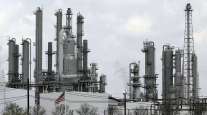Diesel Rises 7.4¢ to $3.407 a Gallon
This story appears in the Jan. 24 print edition of Transport Topics.
U.S. retail fuel prices rose for the seventh consecutive week, as the average price of a gallon of diesel jumped by 7.4 cents a gallon to $3.407, the Department of Energy reported.
The regular gasoline average rose by 1.5 cents to $3.104 a gallon, DOE said after its Jan. 17 survey of fueling stations.
“One of the main reasons that diesel rose so much higher than gasoline was the intense cold in the East . . . which continued into January,” John Felmy, chief economist of the American Petroleum Institute, told Transport Topics.
“Not only did demand for heating oil boost all distillate prices, but diesel can also be substituted for heating oil if necessary, also in-creasing its demand and price,” Felmy said.
Tancred Lidderdale, chief economist at DOE’s Energy Information Administration, said wholesale diesel prices shot up by 13 cents a gallon during the week of Jan. 10, higher than the rise in crude, “and the change is retail prices is going to lag by a few days to a week.”
Diesel is now 53.7 cents more expensive than the comparable week of 2010, while gasoline is 36.5 cents more expensive, DOE said.
The average price last week was the highest since diesel sold for $3.482 a gallon on Oct. 20, 2008, DOE said.
Crude oil’s rise in the middle of November sparked the seven weeks of increases in retail fuel prices, Lidderdale said.
Crude went from $80.44 a barrel Nov. 17 on the New York Mercantile Exchange to $91.51 on Dec. 23, Bloomberg News reported. It has traded in a narrow range of $88 a barrel to the low $90s since then, closing at $90.86 on Jan. 19.
“When diesel prices jump like this, the No. 1 thing that we immediately do is to ask for more money — pretty well insisting upon it — on jobs that we get from brokers,” Anthony Tomase, president of GetGo Transportation Co., Millbury, Ohio, told TT. “If they won’t give us more money to take care of the hike in diesel prices, we don’t take the job because we’ll lose money. It’s as simple as that.”
Tomase said that, “For the most part, all brokers comply, except for the heavily traveled lanes such as east to west, because there is just not enough lane capacity.”
He added that GetGo also put more emphasis on increasing its freight loads from companies over brokers because companies pay increases in fuel surcharges more easily.
“We’ve also gone through the whole laundry list of fuel-saving practices with our drivers again,” Tomase said. “We’ve reminded them again about cutting down on idling time, on shutting down their trucks when they’re stopped, on going only to truck stops where we get the best fuel prices.”
He said that GetGo, which operates 29 tractors and 80 trailers, also was experimenting with electric blankets instead of auxiliary power units to keep drivers warm while sleeping.
“We’ve found they’re good down to a certain temperature, but they’re not effective once it gets really cold [down toward 0 degrees Fahrenheit],” Tomase said, noting the blankets work from the main engine’s battery supply.
“APUs are exorbitantly expensive for a company like ours, something like $9,000 to install one that has only a small heater,” Tomase said.
Michael Evans, executive vice president of business development for Atlas Oil Co., said more truckers have been “looking to lock in future prices or cap future prices right now, but they get interested when the market gets very volatile.”
Atlas Oil, based in Taylor, Mich., distributes diesel and gasoline to about 400 retail fuel stations and several thousand commercial customers, including trucking companies, in 23 states and offers fuel risk-management services.
“Usually, once the market does its crazy things, it’s too late to hedge or cap,” Evans said.
He said that Atlas advises its fleet customers to take a long-term approach to fuel buying.
“You have to be hedging for the right reasons,” Evans said. “If you’re trying to beat the market, that is the wrong reason. . . . Instead, the purpose is to lock in a margin of operating costs that comes from fuel.”
Evans said his successful customers “typically don’t lock everything in, but rather 50% or 75%, and then whether diesel rises or falls, it kind of balances prices out.”




